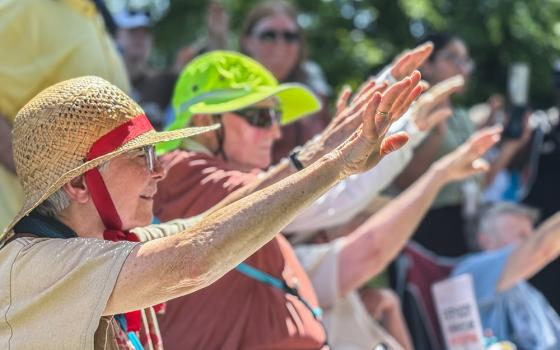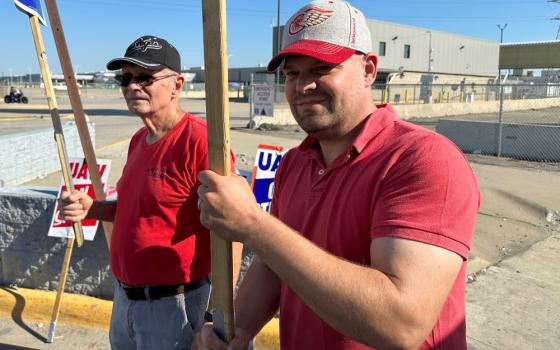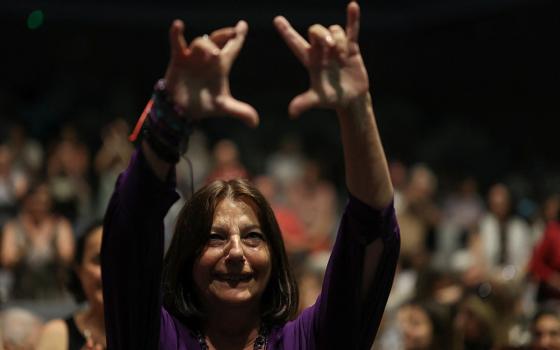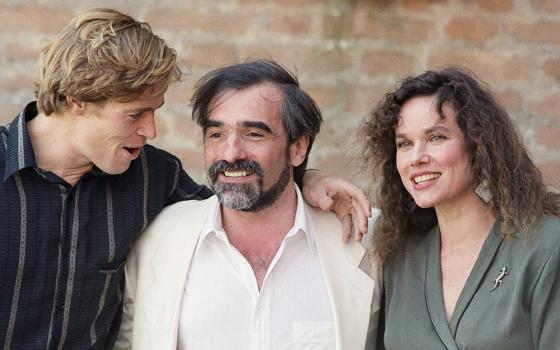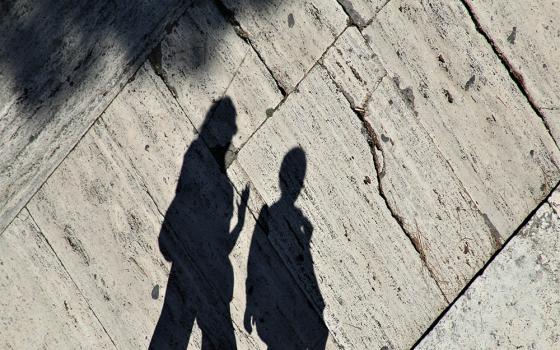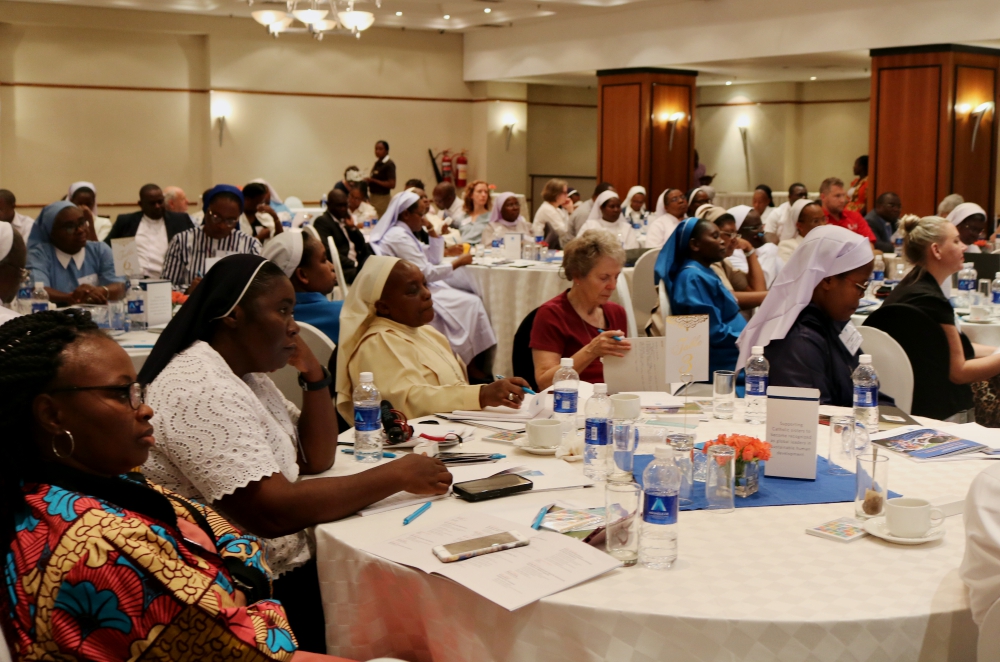
Catholic sisters, partners and grantees attend sessions during the Conrad N. Hilton Foundation's Oct. 23-25 convening in Lusaka, Zambia. (GSR photo / Doreen Ajiambo)
Religious sisters, grantees and partners converged Oct. 23-25 in Lusaka, Zambia, for the Conrad N. Hilton Foundation's discussion of ways in which monitoring, evaluation and learning can be used to achieve the goals and visions for its Catholic Sisters Strategic Initiative Strategy.
About 70 participants from various African countries, the United States and Italy exchanged ideas on how to improve the lives and ministries of African Catholic sisters under the theme "Faith, Hope, Learning, Owning and Communicating the Stories of Sisters."
Sr. Jane Wakahiu, a member of the Little Sisters of St. Francis, Kenya, and director of the Hilton Foundation's Catholic sisters program, said the convening was meant to lay out a structure for gathering and analyzing data that will allow them to monitor progress toward the achievement of the strategy's goals and objectives.
The Africa convening followed a similar gathering Sept. 18-20 at the Hilton Foundation's headquarters in Westlake Village near Los Angeles, which focused on the United States and Latin America and drew about 45 participants. The Hilton Foundation is the major funder of Global Sisters Report.
The Catholic Sisters Strategic Initiative Strategy that the foundation adopted last year includes four broad portfolios — sisters' education, human development services, knowledge and innovation — with specific goals in each of the areas.
In the human development portfolio, for instance, the goal is to strengthen the services Catholic sisters provide to vulnerable people, particularly youth and young adults ages 15-25, focusing particularly on Africa, Mexico and the United States. This will be achieved, the strategy says, in areas in which the sisters have expertise, such as providing education, health care and entrepreneurship opportunities, and countering human trafficking. The target is to reach 300,000 youth and young adults, and for 10 congregations to show demonstrable improvement in skills in providing such services.
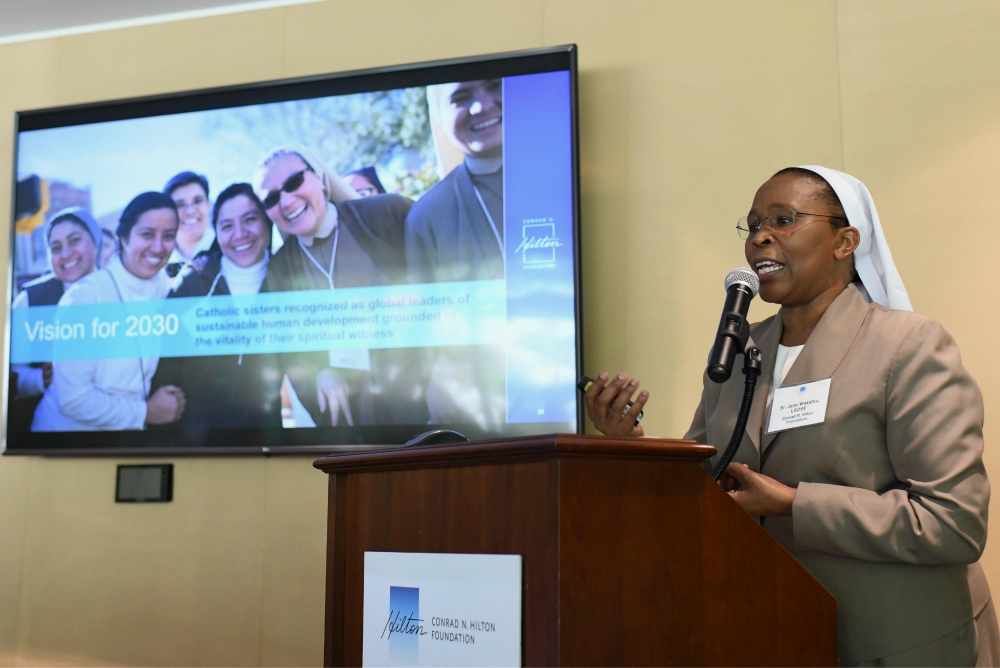
Sr. Jane Wakahiu, director of the Conrad N. Hilton Foundation's Catholic Sisters Initiative, addresses participants at the Sept. 18-20 convening at the foundation's headquarters in Westlake Village, near Los Angeles. (Courtesy of the Conrad N. Hilton Foundation)
The data the initiative collects will help conferences, congregations and partner organizations study and understand their strengths and areas of growth, Wakahiu said.
"We are here to share our experiences and challenges to build a holistic approach to our collaboration and work," she said in an interview with Global Sisters Report in Zambia.
While the convenings in Los Angeles and Lusaka stressed the importance of gathering and reporting data, foundation executives recognized that the ministries of Catholic sisters are fundamentally different from the nongovernmental organizations active in similar areas of need.
"The Catholic sisters' work and what they do is purpose-driven," Wakahiu told participants in Los Angeles. "They don't just do it because they feel they are earning anything. They do it because deep within them, they are responding to God's call and their faith."
The foundation adopted its strategy for 2018-22 for the Catholic Sisters Initiative after conducting an analysis involving more than 40 focus groups and hundreds of interviews. The initiative builds on the sisters' human development work, framing it in the context of the United Nations' 17 sustainable development goals to eliminate poverty and hunger, improve education, and address water quality, climate change and other global needs by 2030.
Although the strategy is a five-year plan, the vision extends to 2030 and beyond, Wakahiu told attendees in Los Angeles and Lusaka.
Advertisement
A key part of the vision is to have "Catholic sisters being recognized as global leaders of sustainable human development grounded in the vitality of their spiritual witness," Wakahiu said in Los Angeles. "Spiritual witness is central."
While many sisters work directly with victims of trafficking or prostitution or with those with diseases such as leprosy, sometimes the sisters' ministry is one of presence, she told convening attendees in Los Angeles.
"Data is key, but we know that some of the work we do cannot be captured in any way," she said. "But we know there are those stories that can be very important." Working with media to get greater recognition of the sisters' ministries is also key, she said.
Indeed, the theme for both gatherings, "Faith, Hope, Learning, Owning and Communicating the Stories of Sisters," was chosen to convey the importance of "how to tell our stories," she said.
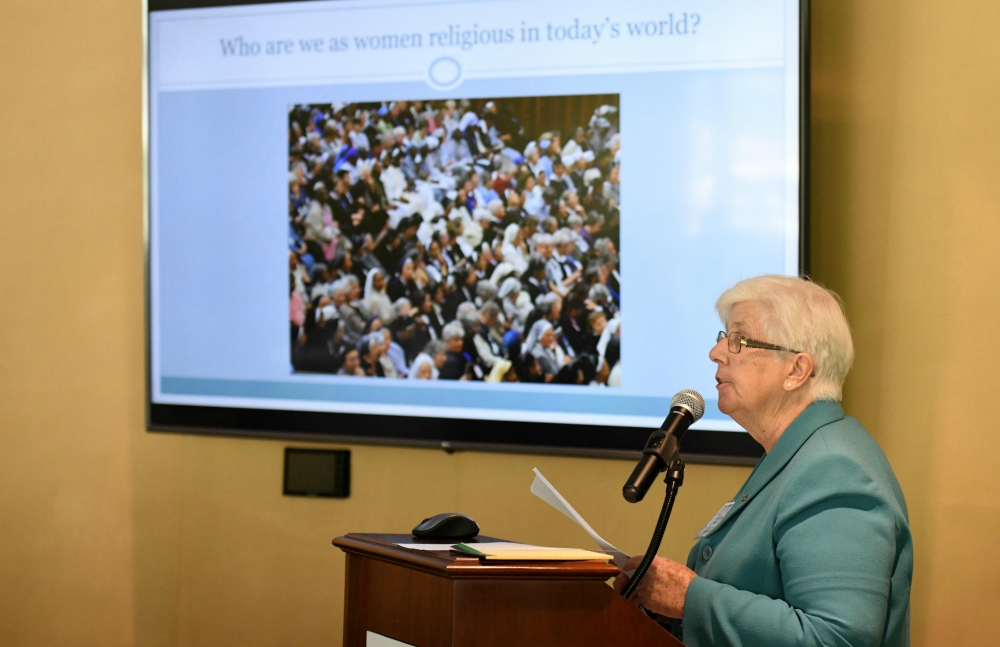
Sr. Pat Murray, a sister of the Institute of the Blessed Virgin Mary and executive secretary of the International Union of Superiors General, addresses participants at the Sept. 18-20 Conrad N. Hilton Foundation convening in Westlake Village, near Los Angeles. (Courtesy of the Conrad N. Hilton Foundation)
The convening in Los Angeles included an address by Sr. Pat Murray, a sister of the Institute of the Blessed Virgin Mary and executive secretary of the International Union of Superiors General. She provided inspiration about religious life and how to respond to the challenges of the world today. She drew from Pope Francis' message for religious institutes "to step out more courageously from the confines of our respective institutes and work together at global and local levels.''
The convenings were structured to allow networking and discussion among attendees to exchange ideas, learn from each other and encourage collaboration. Other sessions at both gatherings focused on data-gathering and measurement, program evaluation, and reporting results to the foundation. These elements are important in assessing whether the Catholic Sisters Strategic Initiative Strategy is achieving its goals or if it needs to make adjustments in the years ahead, Wakahiu said.
During the gathering in Zambia, Sr. Gina Marie Blunck said the Hilton Foundation will continue to support sisters and encouraged them to apply for small grants to complete their pending projects.
"The door is also open for sisters who have small projects for helping the poor and vulnerable," said Blunck, a member of Sisters of Notre Dame and the executive director of Conrad N. Hilton Fund for Sisters.
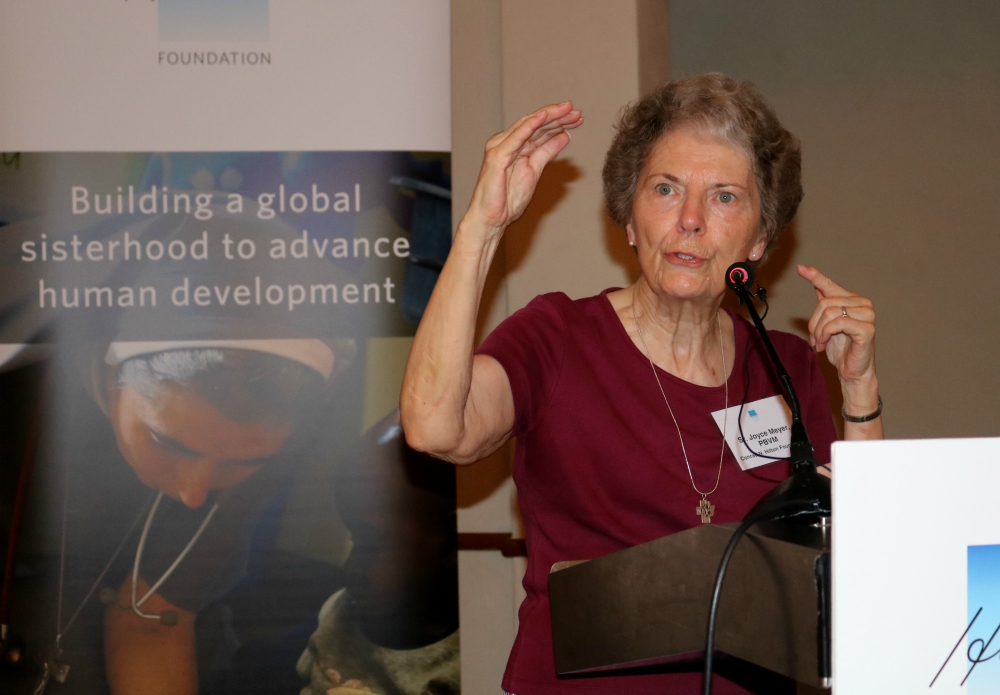
Sr. Joyce Meyer, international liaison for GSR and a member of the Hilton Foundation's board of directors, addresses the Oct. 23-25 Conrad N. Hilton Foundation convening in Lusaka, Zambia. (GSR photo / Doreen Ajiambo)
Sr. Joyce Meyer, international liaison for GSR and a member of the Hilton Foundation's board of directors, commended the participants for attending the convening and encouraged more collaboration between grantees and partners.
"We encourage collaboration with each other and for the beneficiaries to share with us how they have used the finances to do their own development," Meyer, a Sister of the Presentation of the Blessed Virgin Mary of Aberdeen, South Dakota, told GSR in Zambia. "We are also encouraging sisters to change their programs to become social enterprises as a longtime plan to support themselves and be able to create jobs for the communities they are working in."
In her closing remarks, Wakahiu urged the participants in Zambia to take action through their ministries and programs, then evaluate the results to see if they are making a difference, noting that in doing so, the foundation succeeds in its four goals.
"It takes a village to raise a child, and together, we can find solutions to problems we face," she concluded. "Sisters should listen to their inner voice and charism. Where is the voice telling you to go, and what is the area of need? So let us work together as sisters and tell our stories. Storytelling can be a tool for us to articulate our ideas."
[Doreen Ajiambo is the Africa/Middle East correspondent for Global Sisters Report. Gail DeGeorge is editor of Global Sisters Report. Her email address is gdegeorge@ncronline.org. Follow her on Twitter: @GailDeGeorge.]



